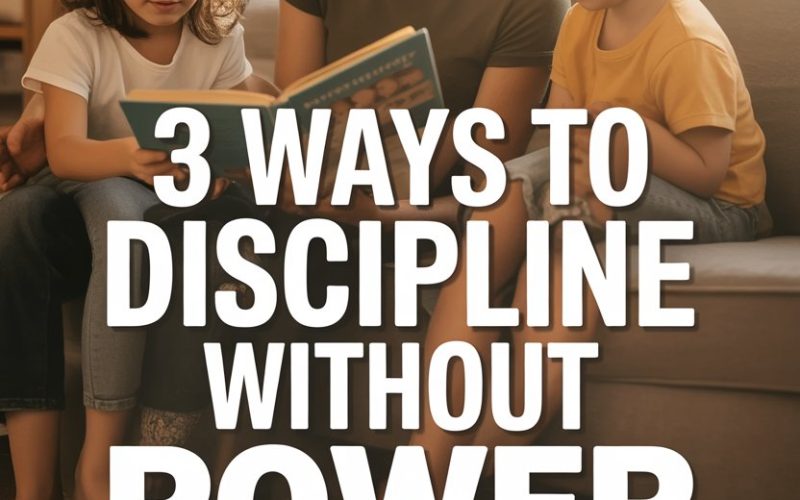Ever tried negotiating with a toddler who’s just discovered the word “no”? It’s like debating with a tiny, biscuit-crumb-covered barrister.
Power struggles can spring up faster than weeds in the veggie patch, and they’ll drain your energy quicker than a midnight nappy run.
But it doesn’t have to be this way. You don’t need to go head-to-head every time shoes don’t go on feet, peas don’t go in mouths, or homework is greeted with dramatic sighs.
There are clever, practical ways to sidestep these battles, even on your busiest days.
Here’s how to keep your cool, maintain authority, and avoid those epic stand-offs that leave everyone grumpy.
1. Stay Calm and Be the Grown-Up (Even When You Want to Join the Tantrum)
You know those moments when your blood pressure climbs and your child’s screaming could probably register on the Richter scale? Here’s the tricky bit: your calm is contagious—but so is your stress.
When you react to a child’s meltdown with raised voices or threats, you’re teaching them that this is how big feelings get handled. (Spoiler: it rarely ends well for anyone.)
According to a study from the Child Mind Institute, children mirror the emotional state of their caregivers. If you can model calmness, it helps your child regulate their own emotions.
Easier said than done, right? Try this:
Take a Pause: Announce, “I need a moment to think,” and step away, even if only to the next room for a quick breather. Sometimes, even a thirty-second reset stops the escalation.
Drop Your Volume: Lowering your own voice forces everyone to listen more closely and signals things aren’t out of control. It’s a sneaky trick that works wonders in loud households.
Empathise Out Loud: “I can see you’re really upset that we have to leave the park. I feel frustrated too when I have to go before I’m ready.” This isn’t coddling; it’s showing you get it, which can break the tension.
The aim? To be the emotional anchor in the room. Children need to know you won’t be swept away by the storm. (Even if you’re actually fantasising about running away to a tropical island with the last packet of crisps.)
2. Set Clear Boundaries and Stick With Them (Without Turning Into a Robot)
Kids are boundary-testers. It’s their job.
Your job is to set those boundaries clearly and stick to them with the patience of a saint (or at least with fewer emotional wobbles than your average three-year-old).
But boundaries don’t mean barking orders like a drill sergeant. The trick is combining warmth with firmness.
The American Academy of Pediatrics recommends clear, age-appropriate rules, explained in plain language.
How does this look in real life? Here’s the secret recipe:
State Expectations Upfront: Instead of waiting until your child is swinging from the curtains, tell them what you expect before a situation arises. “When we go to the shop, we’re not buying sweets today. You can help me pick out the apples.”
Stick to Your Guns: Once you’ve laid out a boundary, don’t budge at the first whiff of protest. Negotiating at this point is like opening Pandora’s box—except instead of hope, you unleash 10,000 more requests for biscuits.
Give Choices Within Limits: Kids love control. Offer options that work for you: “Would you like to brush your teeth before or after you get into pyjamas?”
This gives them a sense of agency, which reduces pushback.
If a boundary is crossed, keep your response simple and consistent. “You threw your toy, so now it goes away for the afternoon.” No lectures, no long-winded explanations.
Just a clear connection between action and consequence.
Also, don’t forget to acknowledge effort: “You remembered the rule about not hitting—even though you were really mad.”
Catch them being good, as parenting expert Dr. Laura Markham suggests, and you’ll see more of that behaviour.
3. Use Natural Consequences (And Ditch the Power Plays)
Ever noticed how the universe has a funny way of teaching lessons? Spilled milk has to be wiped up. Forgotten jumpers mean chilly arms.
Natural consequences are the best teachers—and they don’t require you to morph into the “Mean Mum” or “Grumpy Dad”.
Instead of dishing out unrelated punishments or getting tangled in a battle of wills, let life do a bit of the heavy lifting.
The Cleveland Clinic explains that natural consequences help children link their choices to outcomes, which is way more effective (and less exhausting) than power struggles.
Here’s how to make it work:
Let the Chips Fall: If your child refuses to put their school shoes by the door and ends up scrambling to find them in the morning, resist the urge to swoop in and save the day. That mild discomfort teaches far more than a lecture ever could.
Stay Supportive, Not Smug: Empathy is your sidekick here. “It’s tough when you can’t find your shoes, isn’t it? You’ll probably remember next time.” (Try to keep the “I told you so” face to a minimum.)
Respect Safety Limits: Some consequences (like not wearing a seatbelt) are too risky to allow. Step in when health or safety is on the line. Otherwise, let reality do its thing.
Natural consequences also reduce arguments because you’re not the one making up arbitrary punishments. It’s just, well, life. Less drama for you, more learning for them.
When You’d Rather Eat Cold Toast Than Battle Over Bedtime
Every parent knows the temptation to just give in after a long, hard day. You’re not alone if you’ve thrown up your hands and declared, “Fine! Eat chips for breakfast, see if I care!” (Only to care deeply when the sugar crash comes.)
Discipline isn’t about winning or losing, or outsmarting kids with ever-more-inventive punishments. It’s about teaching, guiding, and helping little people develop the emotional muscles they’ll need for the rest of their lives.
The best part? You don’t need superhuman patience or a degree in child psychology.
With calm, clear boundaries and by letting natural consequences shine, the power struggles start to fizzle out.
On your busiest days, these approaches don’t just save your sanity—they help your kids actually learn something valuable.
And if all else fails? There’s always cold toast. And tomorrow.





